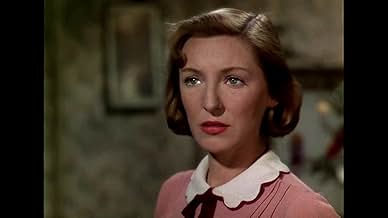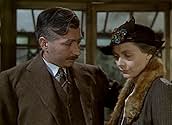VALUTAZIONE IMDb
7,3/10
4368
LA TUA VALUTAZIONE
Aggiungi una trama nella tua linguaJust after World War I, the Gibbons family moves to a nice house in the suburbs. They live an ordinary life throughout the years, but everything changes when World War II breaks out.Just after World War I, the Gibbons family moves to a nice house in the suburbs. They live an ordinary life throughout the years, but everything changes when World War II breaks out.Just after World War I, the Gibbons family moves to a nice house in the suburbs. They live an ordinary life throughout the years, but everything changes when World War II breaks out.
- Regia
- Sceneggiatura
- Star
- Premi
- 1 vittoria in totale
Robin Burns
- Man in Crowd
- (non citato nei titoli originali)
Mabel Etherington
- Lady in Crowd
- (non citato nei titoli originali)
Dan Lester
- Man in Crowd
- (non citato nei titoli originali)
Jim Morris
- Man Operating Small Boats at Fairground
- (non citato nei titoli originali)
Recensioni in evidenza
I throughly enjoyed this little gem of a film. It is very well acted and it was nice to see a smart well groomed Robert Newton being a million miles away from Long John Silver. It had some laughs,some drama and quite a bit of sadness and as you get to know the different characters you feel a genuine fondness for them. I was brought up in the 1950's and recall visiting relatives who had grandmas and spinster aunts living with them, just like in this film. Though there is bickering and some harsh words used by the family, it does represent a time when families stuck together and deep down loved and respected one another. If you get the chance to see this movie, then I am sure that you will enjoy it.
This film caught me completely unawares. I had never heard of it until it presented itself on daytime television one afternoon. I really dislike this type of film, as I find most of the time is spent on mediocre happenings in predictable situations. (Ordinary peoples lives are very boring). I was therefore amazed at the fact that I couldn't leave it, Maybe it's because I am getting older or maybe the people in this film reminded me of the adults of the 1950's when I was a child.
The acting is absolutely superb, you really believe in this family and the ups and downs of their lives. The direction of David Lean polishes the excellent cast performance, what more can I say ! ......Fantastic.....
The acting is absolutely superb, you really believe in this family and the ups and downs of their lives. The direction of David Lean polishes the excellent cast performance, what more can I say ! ......Fantastic.....
The movie narrates the happenings of a British family since the first world war (1914-18) until the end second world war (1939-45) . The parents (Robert Newton and Celia Johnson) , the troubled and rebel daughter (Kay Walsh) , the friendly neighbor (Stanley Holloway) , the seaman son (John Mills) and others . Meanwhile , being reflected the course of time and are succeeding various historic deeds , thus : the first and second world wars , the soldiers recruitment , death of the king George , the jolly reception to Minister Chamberlain after the useless Munich Convention with Hitler , the trenches digging in preventing the bombing over London by the Germans .
The movie is interpreted by the greatest English actors with important careers . Robert Newton (Treasure island) , Celia Johnson (Brief encounter) , John Mills (Daughter of Ryan), Kay Walsh (Oliver Twist), Stanley Holloway (My fair lady) . Colorful and glittering cinematography by Ronald Neame , a future director with many successes (Adventure of the Poseidon) . Musical conducting by Muir Mathieson , habitual of English classic films , as he was director of symphonic orchestra of London . The picture begins and finishes with a camera travelling from exterior and interior home what it subsequently would be copied in a lot of films (for example : The Family by the director Ettore Scola) . The motion picture was perfectly directed by David Lean considered the greatest British filmmaker . Rating : Awesome . Above average.
The movie is interpreted by the greatest English actors with important careers . Robert Newton (Treasure island) , Celia Johnson (Brief encounter) , John Mills (Daughter of Ryan), Kay Walsh (Oliver Twist), Stanley Holloway (My fair lady) . Colorful and glittering cinematography by Ronald Neame , a future director with many successes (Adventure of the Poseidon) . Musical conducting by Muir Mathieson , habitual of English classic films , as he was director of symphonic orchestra of London . The picture begins and finishes with a camera travelling from exterior and interior home what it subsequently would be copied in a lot of films (for example : The Family by the director Ettore Scola) . The motion picture was perfectly directed by David Lean considered the greatest British filmmaker . Rating : Awesome . Above average.
What really boosts THIS HAPPY BREED into the "superior" category of British films is the direction by David Lean and the two central performances by CELIA JOHNSON and ROBERT NEWTON as the heads of a rather ordinary household living the provincial life between two World Wars. And what is surprising is that this '44 film from the U.K. uses Technicolor in an age when most films, unless they were spectacular musicals, were filmed in B&W. The color photography adds a handsome touch to the otherwise unspectacular story that is more a character study of a marriage and family relationships.
CELIA JOHNSON does a magnificent job as the mother who raises a daughter (KAY WALSH) unsatisfied with her family's social status, who yearns to rise above what she perceives as too provincial and runs off with a married man. It's just one of the many episodic tales in this domestic drama but it's played with such intensity by Johnson that the reunion scene toward the end is heartbreaking to watch.
All of the saga which stretches between the two wars is episodic, told in a series of vignettes which I imagine were done in blackout style on the stage, for which the tale was written. But Lean has successfully managed the transfer to the screen and all of the performances are top notch, particularly ROBERT NEWTON as the concerned father, JOHN MILLS as a man caught in an unrequited love affair and STANLEY HOLLOWAY who provides a good deal of comic relief as a boozy neighborhood friend of Newton.
Noel Coward evidently had more success in telling domestic tales with sharp observation of characters than Edna Ferber did with her own American sagas in which her characters seemed to get lost among all the vast territory she covered.
Summing up: Well worth watching for the performances alone.
CELIA JOHNSON does a magnificent job as the mother who raises a daughter (KAY WALSH) unsatisfied with her family's social status, who yearns to rise above what she perceives as too provincial and runs off with a married man. It's just one of the many episodic tales in this domestic drama but it's played with such intensity by Johnson that the reunion scene toward the end is heartbreaking to watch.
All of the saga which stretches between the two wars is episodic, told in a series of vignettes which I imagine were done in blackout style on the stage, for which the tale was written. But Lean has successfully managed the transfer to the screen and all of the performances are top notch, particularly ROBERT NEWTON as the concerned father, JOHN MILLS as a man caught in an unrequited love affair and STANLEY HOLLOWAY who provides a good deal of comic relief as a boozy neighborhood friend of Newton.
Noel Coward evidently had more success in telling domestic tales with sharp observation of characters than Edna Ferber did with her own American sagas in which her characters seemed to get lost among all the vast territory she covered.
Summing up: Well worth watching for the performances alone.
Old-fashioned? Arch dialogue? Stiff acting? Viewable only as an historical document? Guilty on all counts, but this film still captivates. Made during the second World War, it was probably intended as a flag-waver, a morale booster for the worn-down citizens of Britain, but in fact is much more than that. The story (Noel Coward) deals with the lives and times of an ordinary family in 'between the wars' London. There is nothing dramatic, just the everyday events and the weddings, births and funerals that visit us all. However, there are some wonderfully quiet scenes - the father-to-son talk before the son's wedding is especially notable for its old-fashioned moral uprightness, the way the camera lingers in an empty room when the family learns of a terrible road accident, and Frank's gentle chat with his neighbour over a few glasses of whisky as they prepare to go their separate ways. Director David Lean handles these with care and reserve. The way the family deals with the mini-dramas that beset them was no doubt meant to say to the war-weary people that we may be a middling, grey little society with predictable ways, but it was worth fighting for. The film always leaves me a little melancholy, missing an age that still existed in many ways when I was a youngster. No doubt to a modern cinema audience that can't manage without an explosion or car-chase every ten minutes this would be regarded as dull and boring, but I love its charm.
Lo sapevi?
- QuizThe voice of the uncredited opening narrator is that of Laurence Olivier.
- BlooperFrank is shown reading a copy of the 16 September 1930 edition of the Daily Mirror with the headline story about the elections in Germany held on 14 September where the Nazi Party increased their seats in the Reichstag from 12 to 107. He then goes to the back yard to help shake out the tablecloth, but the cherry tree there is still in full bloom, months after the blossoms should have disappeared.
- Citazioni
Frank Gibbons: She didn't pass on, pass over, or pass out! She died!
- Curiosità sui creditiOpening credits prologue: This is the story of a London family from 1919 to 1939.
- ConnessioniFeatured in Jonathan Ross' Must-Watch Films: Crime Films (2023)
- Colonne sonoreRule Britannia
(uncredited)
Lyrics by James Thomson
Music by Thomas Augustine Arne
Sung by Robert Newton (Frank) and Stanley Holloway (Bob) coming home after their reunion
I più visti
Accedi per valutare e creare un elenco di titoli salvati per ottenere consigli personalizzati
- How long is This Happy Breed?Powered by Alexa
Dettagli
- Data di uscita
- Paese di origine
- Lingua
- Celebre anche come
- This Happy Breed
- Luoghi delle riprese
- Alderbrook Road, London, Greater London, Inghilterra, Regno Unito(exteriors of family house near corner with Bellamy St. - still standing in 2022)
- Aziende produttrici
- Vedi altri crediti dell’azienda su IMDbPro
Botteghino
- Budget
- 200.000 £ (previsto)
- Lordo in tutto il mondo
- 158 USD
- Tempo di esecuzione1 ora 55 minuti
- Proporzioni
- 1.37 : 1
Contribuisci a questa pagina
Suggerisci una modifica o aggiungi i contenuti mancanti

Divario superiore
By what name was La famiglia Gibson (1944) officially released in India in English?
Rispondi






























